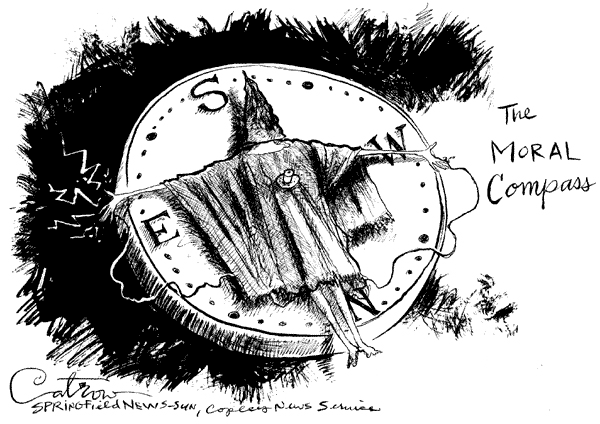by R. Jeffrey Smith
Friday, May. 21, 2004 at 7:04 PM
Sanchez signed the memo on Sept. 25 before it was sent to Central Command for review. A month later, the detailed list of techniques that required special approval was "removed" from the memo.

david_catrow.gif, image/png, 600x424
Increased Pressure Sought on Prisoners
Washington Post, May 21, 2004
Shortly before the physical abuses of Iraqis were photographed in Abu Ghraib prison outside Baghdad last year, the top U.S. military official in Iraq signed a classified memorandum explicitly calling for interrogators to assume control over the "lighting, heating . . . food, clothing, and shelter" of those being questioned there.
The Oct. 12, 2003, memorandum signed by Lt. Gen. Ricardo S. Sanchez called for intelligence officials at the prison to work more closely with the military police guarding the detainees to "manipulate an internee's emotions and weaknesses."
This memo and the deliberations that preceded it were completely shrouded from public view at the time, but now lie at the heart of the scandal that erupted last month over the abuses at Abu Ghraib. Under congressional prodding, the administration has provided a fuller chronology of the events leading up to its approval.
Congressional critics have alleged that language in the memo helped set the stage for the abuses and were part of a Washington-inspired effort to squeeze more information from Iraqis rounded up by the U.S. military and sent to interrogation sessions at the high-security wing of the Abu Ghraib prison, using methods that some consider illegal.
Those involved in formulating the policy say to the contrary that it was legal and successful, having helped bring in useful data on foreign fighters and roadside bomb attacks.
The backdrop for the policy was an event that occurred on May 1, 2003. President Bush landed that day on the deck of the Abraham Lincoln aircraft carrier off San Diego and declared that major combat operations were over. His declaration had direct but unpublicized consequences for those detained in Iraq, military officials say: It meant they were no longer to be treated as prisoners of war, but instead as civilians held by an occupying power.
That meant, the officials said, that the detainees would come under the protections of the fourth article of the Geneva Conventions, which explicitly allows long-term detentions of those considered to pose a threat to governing authorities. An Army captain with 10 years of experience in interrogation, who was serving in Afghanistan, was dispatched in late summer 2003 to Abu Ghraib to improve the interrogation process there.
According to the officials, who briefed reporters at the Pentagon last Friday and congressional staff on Wednesday, the captain made some improvements, using methods she had honed in Afghanistan.
But the Abu Ghraib intelligence unit was soon overwhelmed by a flood of detainees rounded up during Operation Victory Bounty, specifically aimed at capturing members of Saddam Hussein's most loyal fighters, the Fedayeen. Army officers in the field were complaining in the summer of 2003 that they had received no useful intelligence back from the prison.
In a memo signed on Aug. 18, 2003, the Pentagon's Joint Staff -- acting on a request from Defense Secretary Donald H. Rumsfeld and his top intelligence aide, Stephen A. Cambone -- ordered Army Maj. Gen. Geoffrey D. Miller to conduct an inspection there. Miller, who oversaw the interrogation efforts at the U.S. military base in Guantanamo Bay, Cuba, finished his tour on Sept. 9 and left behind his own list of interrogation techniques.
"I think what Miller was trying to do was say, you need something that's maybe a little bit more rigorous," Pentagon spokesman Lawrence DiRita said Friday.
Members of Congress are now investigating how Miller's list -- based on interrogation practices devised for use in Cuba at a site the Pentagon has said is not covered by the Geneva Conventions -- was treated in Iraq.
The military officials said the Army captain memorialized it in a wall posting that said the use of long-term isolation, "working dogs," sleep disruption, "environmental manipulation" and the use of forced "stress positions" were acceptable, but only if they were approved by Sanchez on a case-by-case basis.
Sanchez signed a Sept. 25 memo codifying this policy and then sent it to his superiors at Central Command for review, the officials said. No one has explained precisely what their reaction was, but after what one official called "28 days of coordination," the memo was revised to drop the detailed list of techniques that required special approval.
On Oct. 12, Sanchez signed the new memo, which included a more general statement that "anything not approved, you have to ask for," said one of the officials who briefed reporters. Sanchez has said that after that date, he approved the use of only one harsh technique, long-term isolation, in 25 or so cases.
"I am very comfortable, frankly . . . with that Oct. 12 policy that remained . . . for a period of eight months," Sanchez's legal adviser, Col. Marc Warren, told the Senate Armed Services Committee on Wednesday.
But on May 13, after photos of the abuses had provoked a political firestorm, Sanchez signed another memo, which replaced the Oct. 12 policy and explicitly rules out any approval of "stress positions," as well as other, unspecified, aggressive techniques.
www.washingtonpost.com/wp-dyn/articles/A43708-2004May20.html

